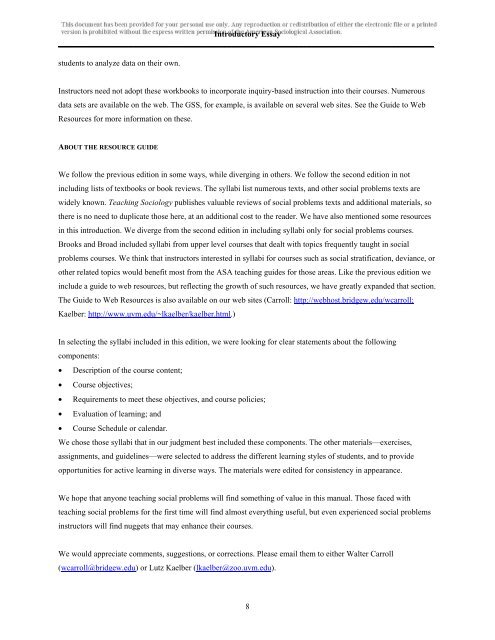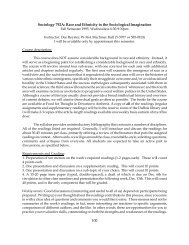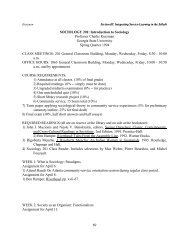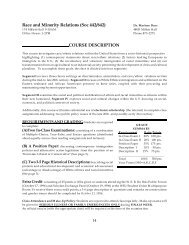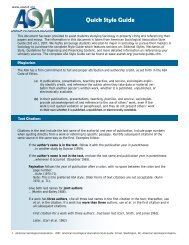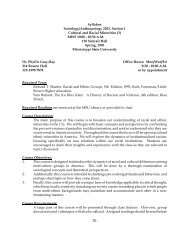Social Problems - American Sociological Association
Social Problems - American Sociological Association
Social Problems - American Sociological Association
Create successful ePaper yourself
Turn your PDF publications into a flip-book with our unique Google optimized e-Paper software.
Introductory Essay<br />
_____________________________________________________________________________________________<br />
students to analyze data on their own.<br />
Instructors need not adopt these workbooks to incorporate inquiry-based instruction into their courses. Numerous<br />
data sets are available on the web. The GSS, for example, is available on several web sites. See the Guide to Web<br />
Resources for more information on these.<br />
ABOUT THE RESOURCE GUIDE<br />
We follow the previous edition in some ways, while diverging in others. We follow the second edition in not<br />
including lists of textbooks or book reviews. The syllabi list numerous texts, and other social problems texts are<br />
widely known. Teaching Sociology publishes valuable reviews of social problems texts and additional materials, so<br />
there is no need to duplicate those here, at an additional cost to the reader. We have also mentioned some resources<br />
in this introduction. We diverge from the second edition in including syllabi only for social problems courses.<br />
Brooks and Broad included syllabi from upper level courses that dealt with topics frequently taught in social<br />
problems courses. We think that instructors interested in syllabi for courses such as social stratification, deviance, or<br />
other related topics would benefit most from the ASA teaching guides for those areas. Like the previous edition we<br />
include a guide to web resources, but reflecting the growth of such resources, we have greatly expanded that section.<br />
The Guide to Web Resources is also available on our web sites (Carroll: http://webhost.bridgew.edu/wcarroll;<br />
Kaelber: http://www.uvm.edu/~lkaelber/kaelber.html.)<br />
In selecting the syllabi included in this edition, we were looking for clear statements about the following<br />
components:<br />
• Description of the course content;<br />
• Course objectives;<br />
• Requirements to meet these objectives, and course policies;<br />
• Evaluation of learning; and<br />
• Course Schedule or calendar.<br />
We chose those syllabi that in our judgment best included these components. The other materials—exercises,<br />
assignments, and guidelines—were selected to address the different learning styles of students, and to provide<br />
opportunities for active learning in diverse ways. The materials were edited for consistency in appearance.<br />
We hope that anyone teaching social problems will find something of value in this manual. Those faced with<br />
teaching social problems for the first time will find almost everything useful, but even experienced social problems<br />
instructors will find nuggets that may enhance their courses.<br />
We would appreciate comments, suggestions, or corrections. Please email them to either Walter Carroll<br />
(wcarroll@bridgew.edu) or Lutz Kaelber (lkaelber@zoo.uvm.edu).<br />
8


